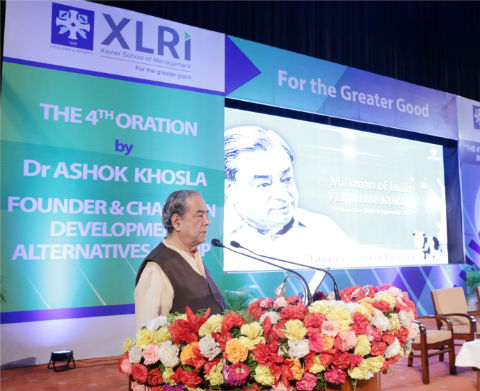Dr. Ashok khosla delivers the 4th ‘Dr. Verghese Kurien memorial oration on sustainable development’ at XLRI
Jamshedpur: XLRI- Xavier School of Management organized the 4th “Dr Verghese Kurien Memorial Oration on Sustainable Development” on Saturday, 23rd September, 2017. Organised under the aegis of Fr Arrupe Center for Ecology and Sustainability (FACES), XLRI, in memory of the Founder of AMUL Dr. Verghese Kurien, otherwise known as “the Milkman of India”, the oration aims to provide a platform to listen to and learn from thought leaders, social entrepreneurs, development sector professionals and policy makers who have made a significant contribution to the idea of an empowered, prosperous and sustainable society.
This year, Dr. Ashok Khosla, eminent environmentalist and Founder & Chairman, Development Alternatives Group delivered the oration on the topic “The Machine Revolution: Fulfilling the Aspirations of Rural India”.
In his speech, Dr. Khosla said, “Some 70 years ago, Dr Verghese Kurien created Amul, one of the most successful social enterprises in history. Over this period, Amul pioneered technical, managerial, and institutional innovations that led to remarkable progress in India’s dairy industry – taking it from one of the least productive in the world to becoming the largest in any country within a few decades. The immense magnitude of Dr Kurien’s contribution to the nutrition and health of the nation’s people, was accompanied with a comparable impact by the organisations he created on the incomes, social status, education of the dairy farmers, who were his first and most heartfelt concern.
He added, “The “White Revolution” brought enormous quantities of protein into the diets of India’s population, complementing the massive quantities of calories provided by the ‘Green Revolution’. The efforts of scientist/practitioners like Dr Kurien have certainly enabled large numbers of our fellow citizens to live healthier and more productive lives. Beyond nourishing food, people also have other basic needs such as water, energy for lighting and cooking, shelter, clothing, knowledge, health care and, above all, livelihoods and jobs.”
Emphasizing on the topic of his oration, ‘The Machine Revolution’, Dr. Khosla said, “Improving lives means improving productivity. Productivity of labour, productivity of the land, and productivity of resources, such as water, energy and materials. And improving productivity needs technology, to extend and multiply the capabilities of the human and animal effort on which the large numbers of our marginalised compatriots solely depend. Technology means tools, instruments, methods and know-how, all of which can be subsumed under the metaphor of a “machine”. Some of the machines needed for improving the economic performance of rural communities already exist, resulting from the 200 years of experience worldwide since the Industrial Revolution. Others, needed to address the different life and livelihood issues that are peculiar to the rural economy, must be invented and delivered to a widespread market. This requires “disruptive innovation” of the kind pioneered by the Green and White Revolutions: a new “Machine Revolution”.
To explain how ‘machines’ and institutions that can bring about the kinds of impacts on the lives and livelihoods of India’s rural poor, Dr. Khosla gave example of TARAlife, a social enterprise recently set up by the Development Alternatives Group in his speech.
TARAlife is the latest initiative of the globally recognized 35-year-old social enterprise Development Alternatives Group to motivate and help entrepreneurs create local industries and sales channels for basic needs and aspirational products, and simultaneously generate jobs, income and purchasing power in rural areas. It is a new enterprise was launched on 17 March 2017 as a market-based solution to poverty, hunger and environmental destruction with the purpose not only to deliver good financial returns on investment but also make much needed transformational economic, social and environmental contributions to India’s future.
In his address, Fr. E Abraham, S. J. Director of XLRI said, “Dr. Kurien’s remarkable life and achievements are an embodiment of his faith in the ability of the common man to exercise control over his destiny. This faith helped him to create world-class institutions that become shining examples of excellence (e.g., GCMMF, IRMA, NDDB, etc.), which enabled ordinary people to achieve extraordinary results.
He strongly believed that by placing technology and professional management in the hands of farmers, the living standards of millions of rural poor could be improved. His creation of community-owned co-operatives empowered millions of rural families, most of whom were landless and small farmers, in India.”
Remembering Dr. Kurien, Fr. Abraham said, “XLRI’s relationship with Dr. Kurien goes back to over 24 years. I personally had an enriching association with Dr Kurien and was greatly inspired with his visionary foresight and single-minded determination in executing his vision for the dairy sector and more importantly in helping raise the living standards of millions of rural milk producers across thousands of villages in India.”
“We decided to institute this Annual Oration to commemorate Dr Kurien’s legacy – because his life and work exemplifies the model for a responsible management leader, combining business skills with the larger good of the society and nation-building,” Fr. Abraham further added.
The event was also graced by Mr. T V Narendran, Chairman, XLRI Board of Governors and MD – Tata Steel, Fr. E Abraham, S. J. Director of XLRI and Dr. Ashis K. Pani, Dean (Academics), XLRI and
Dr. Madhukar Shukla, Chairperson, Fr. Arrupe Center for Ecology & Sustainability, XLRI.

